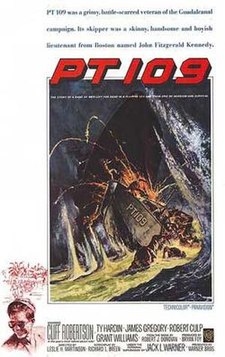PT-109
PT-109 is a rare biopic in that its subject matter was still alive to see it. In fact, in the annals of Presidential biopics, PT-109 is, if memory serves correct, one of only three biopics when the subject was not just still alive but in office.
The other Presidential biopics made during said President's term: W. and the Obama first-date movie Southside With You.
While Oliver Stone's film of the 43rd President was, shall we say, a little biased against its subject, PT-109 had the full cooperation and endorsement of President John F. Kennedy. As such, it is suspect as to whether the film would have been anything other than a de facto reelection commercial. Sadly, the film was released five months before JFK's assassination, so there's no way of knowing whether PT-109 would boost JFK's standings.
New U.S. Navy Lieutenant John F. Kennedy (Cliff Robertson) has arrived in the Pacific, ready to take command. His new crew isn't particularly thrilled with this green commander, but being servicemen, they follow orders. Kennedy eagerly accepts command of the PT-109, a ship that has seen better days. Ever cool, calm, and collected, he gets his crew to put the old ship together and make it ship-shape.
On one of his missions, his ship rescues men trapped by the Japanese on a beach and barely manages to get everyone before the 109 runs out of gas. They come perilously close to capture, but manage to get rescued themselves. On another, the 109 fails to stop in time and crashes onto a shed floating on a small American-held island.
This is a minor inconvenience as we get to the gist of the story: when the 109 is sliced in two by a Japanese warship. Kennedy manages to get the survivors aboard one half of the ship, but realizes the ship will not hold. There's also the danger of enemy capture, so he orders his men to swim three miles to an island that may or may not have Japanese troops. He brings them to safety, including one seriously injured whom he carries across on his back.
On the island, there is tension and fear, but Kennedy remains resolute. The Navy searches for him and the PT-109 crew, but believes them dead. Two swimming expeditions by Kennedy and his friend/new officer Ensign Ross (Robert Culp) finds nothing. However, as it happens, two natives come across the group and Kennedy & Ross send a message through them via coconut. This message is received by Australians, and they are rescued.
With that, the injured get treated, and while Kennedy can leave the theater of war due to his experiences, he opts to remain.
The question one should ask while watching PT-109 is 'would it be interesting if the main character were named Barney Ross and not John Fitzgerald Kennedy?' In other words, if this were just another war film, or even a biographical one about the Naval version of Audie Murphy, would we as the audience care?
My answer is, 'not really'. This is because PT-109 I figure already takes it for granted that we know who the subject is and, if not familiar with the story, at least aware of the main character. For all the importance that this had on the life (political and private) of the future President, PT-109 never bothered to get into what made this a turning point for Jack.
In fact, as played by Robertson (whose casting President Kennedy approved), Kennedy comes across as a pretty flat, even boring character. It is a fantastic story: scion of Boston wealth (though not a Brahmin), a bit of a dilettante, fresh out of Harvard (or Haavaad), goes into war rather than avoid it.
Curiously, JFK's teasing of the correct pronouncing of "Harvard" was the ONLY hint of Kennedy's distinct Massachusetts accent, which Robertson didn't bother to try for.
PT-109, however, makes JFK a remarkably simple figure: calm, stoic, but with no energy, nothing to recommend him for any interest.
Same goes for the crew, many of whom I didn't even remember. The only thing I recall about the crew was that the future Mr. Roper from Three's Company and the future Baretta (who did NOT murder his wife per a jury's decision).
Part of the problem with PT-109 was also the staging of the film. Many times the sets looked like sets, particularly when they are stranded on the island. This is curious given that the film was 'personally supervised' by Warner Brothers head Jack L. Warner himself per the screen credits. At what is suppose to be the dramatic moment of the film, the actual disabling of the PT-109, it wasn't all that interesting, particularly because it looked so staged and fake.
Still, there were some parts that were good. The first battle where the PT ship rescues the men pinned on the beach was not bad.
PT-109, sadly, was a little too in love with its subject to make him interesting. It's an interesting time capsule on how Hollywood went out of its way to curry favor with the President (something Hollywood has been doing with every Democrat since). It's far too long for the story that it's telling, but PT-109 is one of those films that cries out for a remake.
Separated from any Kennedy worship, this story of a true Profile in Courage could make for a fascinating character study/action film. The story is there. All it needs is a good director, good actor, and good script.
 |
| 1917-1963 |
DECISON: C-


No comments:
Post a Comment
Views are always welcome, but I would ask that no vulgarity be used. Any posts that contain foul language or are bigoted in any way will not be posted.
Thank you.